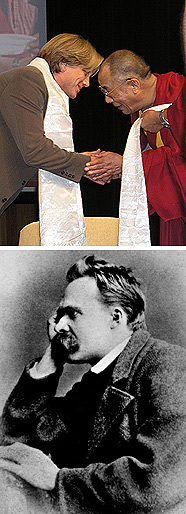Berkeleyan
A new spin on the breadth requirement
L&S Discovery Courses take the pain out of exploring the unknown
![]()
| 25 August 2005
Undergraduates in the College of Letters and Science have long been required to fulfill a breadth requirement, a condition many greet less than enthusiastically. "They looked at the requirement as something they have to get out of the way — that's the kind of language they use," says Robert Holub, dean of the undergraduate division of L&S.
Hardly unsympathetic to the students' plight, Holub says that while they have long received a list of courses that would satisfy the requirement, the selection consisted primarily of courses developed within the context of a particular discipline. "I wanted to see courses designed so that students would get a good general understanding of an area they're not majoring in," he says.
 Psychology Professor Dacher Keltner (above left, with the Dalai Lama) will teach a Discovery Course on the topic of benevolence. L&S undergraduate dean Robert Holub's course will examine the thinking of Marx, Nietzsche (above, right), and Freud. |
"The faculty who are teaching these courses have what I'd call a missionary zeal," says Holub. "They want to reach beyond the narrow audience in their discipline and let other students know what they're doing in their field."
One professor who embodies that enthusiasm is Richard Muller, who has been teaching Physics for Future Presidents for five years. Muller describes the class as "designed to teach physics to people who didn't think they could learn it. Too often we intimidate students or make them feel physics courses are only for professional physicists. In fact, we live in an incredibly technological world, and I regard physics as the liberal arts of technology."
Many physics professors who teach courses intended for non-majors convey the impression that the students aren't smart enough to be physicists, says Muller. Even the typical title for such courses, physics for poets, is one Muller finds narrow, if not derisive.
"I assume that my students are headed for careers in diplomacy, politics, and business," he says. "These students don't have the time or inclination to master the math. Whereas previous physics courses for non-majors held back and taught only the most elementary concepts, I skip over the math and get directly to the important information."
For example, when Muller teaches about radioactivity in the fourth week of the class, he begins by discussing the havoc it wreaks on human health, and how it causes cancer and radioactive illness. He draws his students' attention to the effects of the 1945 bombing of Hiroshima and the nuclear accident that occurred in Chernobyl in 1986. "Normally these subjects are tagged on in the last 10 minutes of a discussion about radioactivity, but these are the subjects that make radioactivity so important to a future president," explains Muller. "Once the students have learned the fundamental issues of health and radioactivity, then they're eager to delve into the topic further."
Muller's goal is to make science accessible. "Every semester I get comments from the students saying, 'I didn't know technology and science articles were for me.' That really is a discovery," says Muller. "I teach them never to be intimidated by physics — never. If they feel intimidated, the problem is not with them, it's either with the article or the person they're talking to who can't explain things in a way that can be understood."
Exploring 'the grand issues of social theory'
Ann Swidler is taking a decidedly different tack in her course, Global Transformation and Cultural Change: NGOs, AIDS, and Sub-Saharan Africa. Swidler, a professor of sociology, is developing the course specifically for the new L&S program. The course, which Swidler will roll out next spring, will be interdisciplinary, drawing on epidemiology, anthropology, political science, sociology, and history. "I'll be trying to help students see that big ideas are at stake in the contemporary global situation," explains Swidler. "AIDS in Sub-Saharan Africa is the perfect example of a new global society emerging with all its contradictions and complexities."
Swidler plans to focus on non-governmental organizations (NGOs) working in Africa, including the Peace Corps, Doctors Without Borders, and Save the Children.
"Most of the NGOs are made up of European and American activists who are trying to come to terms with societies very different from their own," she says. By exposing students to the enormous variety of African societies, Swidler hopes to get them excited about "the grand issues in social theory: relativism versus moral absolutes, whether and how humanhood is socially shaped, the construction of modern nation states, and the nature of capitalist societies." She elaborates: "What does it mean for one group to say to another, 'Your sexual practices are wrong — you need to change them; respect human rights; practice gender equality?'"
Swidler's enthusiasm for her subject and the new course she's developed is abundantly evident. "I think Discovery Courses can present big-picture questions about the world that just would never have occurred to students otherwise. They have the potential to lift students out of the humdrum vocational orientation toward education and make it really exciting."
A complete list of the 20 Discovery Courses for 2005-06 is online at lsdiscovery.berkeley.edu.

